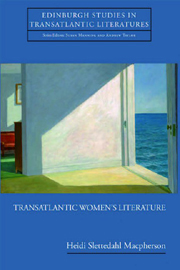Book contents
- Frontmatter
- Contents
- Acknowledgements
- Introduction: ‘No Region for Tourists and Women’
- Part 1: The Exoticised Other
- Part 2: Memoirs and Transatlantic Travel
- Part 3: Negotiating the Foreign/Re-Inventing Home
- Introduction
- 5 ‘An Invention of the Americans’: Negotiating the Foreign in Anne Tyler's Novels
- 6 Cross-Dressing and Transnational Space: Isabel Allende's Daughter of Fortune
- Conclusion
- Bibliography
- Index
5 - ‘An Invention of the Americans’: Negotiating the Foreign in Anne Tyler's Novels
from Part 3: Negotiating the Foreign/Re-Inventing Home
Published online by Cambridge University Press: 12 September 2012
- Frontmatter
- Contents
- Acknowledgements
- Introduction: ‘No Region for Tourists and Women’
- Part 1: The Exoticised Other
- Part 2: Memoirs and Transatlantic Travel
- Part 3: Negotiating the Foreign/Re-Inventing Home
- Introduction
- 5 ‘An Invention of the Americans’: Negotiating the Foreign in Anne Tyler's Novels
- 6 Cross-Dressing and Transnational Space: Isabel Allende's Daughter of Fortune
- Conclusion
- Bibliography
- Index
Summary
According to Charles Vandersee, ‘America is a site where people appear by accident and meet by accident rather than by ancestry and assignment.’ As if to prove this contention, Anne Tyler has developed a canon of accidental encounters, where individuals meet, form new, loose families with permeable boundaries, and, often, depart again. In doing so, they touch on the foreignness of others, outsiders who do not belong to genetic families but whose presence alters such families in dynamic and unstable ways. This chapter explores the construction of ‘foreignness’ in Anne Tyler's The Accidental Tourist (1985) and Digging to America (2006) in order to relate concepts of ‘the foreign’ to those of the ‘familiar’ in its literal sense: that is, relating to the family. It will also assess the ways in which Tyler's conception of each has altered over the last twenty years, especially given her focus on a contested ‘domestic realism’, a critical framework that seems, by its very title, to focus on home rather than away. I argue that this ‘convenient’ critical framework is problematised throughout Tyler's oeuvre.
In The Accidental Tourist, home is shown to be a refuge that hinders growth: the central character, Macon Leary, returns to his original family home after the disintegration of his marriage, and on each of his travels, he is constructed as an archetypal (if exaggerated) American traveller who seeks the familiar and the ‘American’ as opposed to the ‘foreign’; through him, I argue, Tyler offers a critique of Americanisation itself.
- Type
- Chapter
- Information
- Transatlantic Women's Literature , pp. 134 - 154Publisher: Edinburgh University PressPrint publication year: 2008



